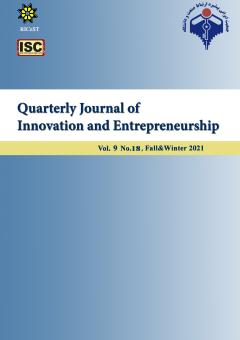The relationship between managers' business intelligence and organizational entrepreneurship (Case Study: Selected Branches of Bank Melli in Isfahan)
Subject Areas : GeneralHadi Teimouri 1 , Naeime Mohammadrezaei 2 , Elham Ghasemi 3 , maryam Dezhtaherian 4
1 -
2 - M.S Candidate of Management Department, University of Isfahan, Isfahan, Iran
3 -
4 -
Keywords: Business Intelligence, Organizational Entrepreneurship, Melli Bank of Isfahan,
Abstract :
Undoubted the business intelligence is the new approach to business and organizational architectures that provides quick access to data and analyze them based on users. Another aspect entrepreneurship is a key role in developing the economy and stability of all societies. So that today an indicator of the growing development in numerous countries. Therefore, the present study aims to explore the relationship between business intelligence and organizational entrepreneurship from the viewpoint of managers and employees of Melli Bank of Isfahan. A stratified random sampling method was used and a sample size of 140 was chosen from among 200 persons. The collected data was analyzed via SPSS and AMOS software. The results of this study reflect the reality that business intelligence managers have a significant impact on organizational entrepreneurship.
1. الوانی، س- م. (1385). مدیریت عمومی. تهران: نشر نی.
2. سعیدی مهرآباد، م. مهتدی، م- م. (1378). تاثیر آموزش کارآفرینی بر توسعه رفتارهای کارآفرینانه (مطالعه موردی: آموزش¬های کارآفرینی وزارت کار و امور اجتماعی)، توسعه کارآفرینی، 72-57.
3. Banerjeea, M. Mishrab, M.(2015).Retail supply chain management practices in India: A business intelligence perspective, Journal of Retailing and Consumer Services, In press.
4. Chung, W. Tseng, T. (2012). Discoverring business intelligence from online product reviews:A rule-induction framework, Expert Systems with Applications 39,11870-11879.
5. Foshay , N. and Kuziemsky ,C.(2014). Towards an implantation framework for business intelligence, international jornal of information management, 34(1);20-27.
6. Ghazanfari, M. Jafari, M .Rouhani, S. (2011). A tool to evaluate the business intelligence of enterprise systems,ScientiaIranica E , 18(6) , 1579-1590.
7. Howston, C. (2008). Successful business intelligence: secret to making BI a killer app. 1th edition, The McGraw-Hill companies, 244 p.
8. Kowalczyk, M. Buxmann, P.(2015). An ambidextrous perspective on business intelligence and analytics support in decision processes: insights from a multiple case study. Decision support systems. Volume 80. 1-13.
9. Kubina, M. Koman, G. Kubinova, I. (2015). Possibility of improving efficiency within business intelligence systems in companies. Procedia Economics and Finance. 300-305.
10. Mosavi Rad, T. Farahani, A. Nejat Isfahani , A. Honari, H. (2012). Desining the model of corporate entrepreneurship based on the relationship between corporate strategy and dimension of corporate entrepreneurial orientation in physical education organization exercise management; 4(12): 201-217 (In Persian).
11. Shankha Chakraborty, J.Thompson, Etienne B.Yehoue. (2016). The culture of entrepreneurship. Journal of economic theory. In press.
12. Wang, C-H. (2016). A novel approach to conduct the importance-satisfaction analysis for acquiring typical user groups in business-intelligence systems, Computers in Human Behavior,54, 673–681.


